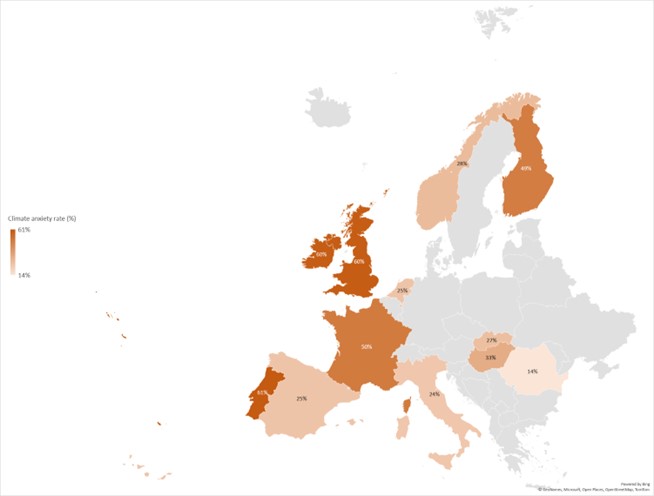Understanding Gen Z’s Climate Anxiety: A Look at the Latest Research
Abstract
Nowadays, the widespread availability of information on climate change has made up-to-date knowledge in this area more accessible to a broad section of society. At the same time, this information overload can potentially threaten psychological well-being. In particular, a specific form of anxiety, commonly known as climate (change) anxiety, is a substantial problem. Although climate anxiety terminology only became commonplace a few years ago, the phenomenon itself has older roots. It includes several responses to climate change, the complexity of which assumes more detailed knowledge. The fact that climate disasters are becoming more common may generate intense negative emotions such as fear, depression, tension, and rage. According to current studies, stress derived from climate change is most prevalent among Generation Z. This generation group is the focus of researchers due to their outstanding environmentally conscious approach. They are possibly expected to make the most important decisions in the future, and worries about climate change may significantly influence their decisions. Researchers need to analyze the multiple causes of this phenomenon and the actions they induce. This economic literature review aims to summarize the main observations from the international literature in this field.
References
Berry, H. L., Bowen, K., Kjellstrom, T. (2010). Climate change and mental health: a causal pathways framework. International Journal of Public Health. 55(2), 123–132. DOI: https://doi.org/chfmsb
Böhm, G. (2003). Emotional reactions to environmental risks: Consequentialist versus ethical evaluation. Journal of Environmental Psychology. 23(2), 199–212. DOI: https://doi.org/cmntr3
Clayton, S., Karasia, B. T. (2020). Development and validation of a measure of climate change anxiety. Journal of Environmental Psychology. 69, 101434. DOI: https://doi.org/gg5k28
CPA – Climate Psychology Alliance (2022). Climate Psychology Handbook. URL: https://www.climatepsychologyalliance.org/images/files/handbookofclimatepsychology.pdf (Downloaded: 12 February 2024)
Cunsolo, A., Harper, S. L., Minor, K., Hayes, K., Williams, K. G., Howard, C. (2020). Ecological grief and anxiety: The start of a healthy response to climate change. Lancet Planet Health. 4(7), 261–263. DOI: https://doi.org/gmq53r
Dodds, J. (2021). The psychology of climate anxiety. The British Journal of Psychiatry. 45(4), 222–226. DOI: https://doi.org/hr37
European Commission (2017). Special Eurobarometer 468: Attitudes of European citizens towards the environment. URL: https://data.europa.eu/data/datasets/s2156_88_1_468_eng?locale = en (Downloaded: 19 February 2024)
Haines, A., Kovats, R. S., Campbell-Lendrum, D., Corvalan, C. (2006). Climate change and human health: impacts, vulnerability, and public health. Public Health. 120(7), 585–596. DOI: https://doi.org/b4vzhq
Hawcroft, L. J., Milfont, T. L. (2010). The use (and abuse) of the new environmental paradigm scale over the last 30 years: a meta-analysis. Journal of Environmental Psychology. 30(2), 143–158. DOI: https://doi.org/cv29nt
Hickman, C., Marks, E., Pihkala, P., Clayton, S., Lewandowski, R. E., Mayall, E. E., Wray, B., Mellor, C., van Susteren L. (2021). Climate anxiety in children and young people and their beliefs about government responses to climate change: A global survey. The Lancet Planetary Health. 5(12), 863–873. DOI: https://doi.org/gn9582
Hines, J. M., Hungerford, H., Tomera, A. N. (1987). Analysis and synthesis of research on responsible environmental behavior: a meta-analysis. Journal of Environmental Education. 18(2), 1–8. DOI: https://doi.org/fpqcq9
Kelly R., Elsler, L. G., Polejack, A., van der Linden, S., Tönnesson, K., Schoedinger, S. E., Santoro, F., Pecl, G. T., Palmgren, M., Mariani, P., Glithero, D., Evans, K., Cvitanovic, C., Cook, J., Bartram, J., Wisz, M. S. (2022). Empowering young people with climate and ocean science: Five strategies for adults to consider. One Earth. 5(8), 861–874. DOI: https://doi.org/m524
Kleres, J., Wettergren, A. (2017). Fear, hope, anger, and guilt in climate activism. Social Movement Studies. 16(5), 1–13. DOI: https://doi.org/gqmfvh
Leung S., Brennan, N., Freeburn, T., Waugh, W., Christie, R. (2022). Youth Survey Report 2022. Sydney, NSW: Mission Australia. URL: https://www.missionaustralia.com.au/what-we-do/research-impact-policy-advocacy/youth-survey (Downloaded: 6 February, 2024)
Martiello, M. A., Giacchi, M. V. (2010). High temperatures and health outcomes: A review of the literature. Scandinavian Journal of Public Health. 38(8), 826–837. DOI: https://doi.org/btm9gg
McIntosh, C. (ed.) (2023). Cambridge Advanced Learner’s Dictionary & Thesaurus. Cambridge University Press, Cambridge.
Milfont, T. L. (2012). The interplay between knowledge, perceived efficacy and concern about global warming and climate change: A one-year longitudinal study. Risk Analysis. 32(6), 1003–1020. DOI: https://doi.org/ggj7dk
Noth F., Tonzer L. (2022). Understanding climate activism: Who participates in climate marches such as “Fridays for Future” and what can we learn from it? Energy Research &; Social Science. 84, 102360, 1-7. DOI: https://doi.org/m525
Ogunbode, C. A., Doran, R., Hanss, D. ..., Karasu, M. (2022). Climate anxiety, well-being, and pro-environmental action: correlates of negative emotional responses to climate change in 32 countries. Journal of Environmental Psychology. 84(18), 10187. DOI: https://doi.org/gqzfxv
Ray, S. J. (2020). A field guide to climate anxiety: How to keep your cool on a warming planet. University of California Press, Oakland. 30-51.
Stanley, S., Hogg, T. L., Leviston, Z. and Walker, I. (2021). From anger to action: Differential impacts of eco-anxiety, eco-depression, and eco-anger on climate action and well-being. The Journal of Climate Change and Health. 1, 100003. DOI: https://doi.org/gh6sd4
UNESCO (2021). Youth Climate Voices: Youth climate justice survey 2021. UNESCO. URL: https://ecounesco.ie/wp-content/uploads/2021/12/2021-Survey-report-v2_compressed.pdf (Downloaded: 12 February 2024)
UNICEF (2022). Kutatás: Hogyan gondolkoznak a fiatalok a klímaváltozásról? [Research: How young people think about climate change]. UNICEF. URL: https://unicef.hu/igy-segitunk/hireink/a-magyar-fiatalok-90-szazaleka-szorong-a-klimavaltozas-miatt (Downloaded: 12 February 2024)
USC Sustainability (2022). USC Sustainability 2028 Plan Survey: Survey Results. URL: https://sustainability.usc.edu/wp-content/uploads/2022/08/2022-USC-Sustainability-Survey-Report-8-31.pdf (Downloaded 12 February 2024)
Van Liere, K. D., Dunlap, R. E. (1980): The social bases of environmental concern: A review of hypotheses, explanations, and empirical evidence. Public Opinion Quarterly. 44(2), 181–197.
Xu, Y, Dadvand, P., Barrera-Gómez, J., Sartini, C., Marí-Dell’Olmo, M., Borrell, C., Medina-Ramón, M., Sunyer, J. and Basagaña, X. (2013). Differences in the effect of heat waves on mortality by sociodemographic and urban landscape characteristics. Journal of Epidemiology and Community Health. 67(6), 519–525. DOI: https://doi.org/f4wx97




















